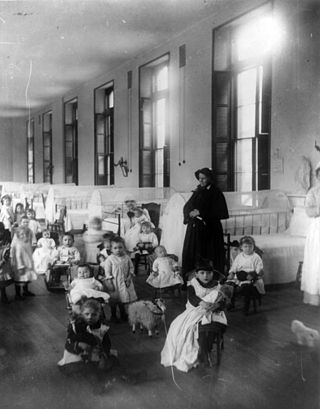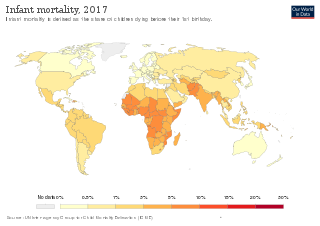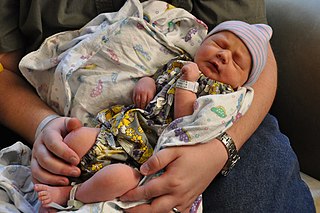This article has multiple issues. Please help improve it or discuss these issues on the talk page . (Learn how and when to remove these messages)
|

Baby books are scrapbooks used by parents to track their children's development.
This article has multiple issues. Please help improve it or discuss these issues on the talk page . (Learn how and when to remove these messages)
|

Baby books are scrapbooks used by parents to track their children's development.
Baby books first became popular over 100 years ago[ when? ] to keep track of children's diseases, immunization records, and growth. Baby books started appearing more frequently in homes in the 1910s but gained popularity in the succeeding decades. [1]
Baby books can track a child's development or mark developmental milestones. Many have ledgers that can track disease and immunizations. Some books are pre-fabricated with fill-in-the-blank areas and places to put special mementoes, such as a lock of hair from the baby's first haircut, a hospital bracelet, birth announcements, or cards from the baby shower. Parents may include ultrasound pictures, pictures of the baby at birth, and pictures as the child grows up. Parents can look at baby books for memories.
Baby books have also been used for research. UCLA has a collection of baby books dating back to 1882 used for the study of the history of childhood, family, art, medicine, architecture, and other disciplines. [2]
Various memories can be included in the baby books, like birth story, baby shower, naming of the baby, first cry, walking or sitting, first movement, saying first word, as well as various occasions like first Christmas, Easter, Thanksgiving, Pictures for each month Christening/Baptism/Dedication.

Developmental psychology is the scientific study of how and why humans grow, change, and adapt across the course of their lives. Originally concerned with infants and children, the field has expanded to include adolescence, adult development, aging, and the entire lifespan. Developmental psychologists aim to explain how thinking, feeling, and behaviors change throughout life. This field examines change across three major dimensions, which are physical development, cognitive development, and social emotional development. Within these three dimensions are a broad range of topics including motor skills, executive functions, moral understanding, language acquisition, social change, personality, emotional development, self-concept, and identity formation.

Adoption is a process whereby a person assumes the parenting of another, usually a child, from that person's biological or legal parent or parents. Legal adoptions permanently transfer all rights and responsibilities, along with filiation, from the biological parents to the adoptive parents.

Infant mortality is the death of an infant before the infant's first birthday. The occurrence of infant mortality in a population can be described by the infant mortality rate (IMR), which is the number of deaths of infants under one year of age per 1,000 live births. Similarly, the child mortality rate, also known as the under-five mortality rate, compares the death rate of children up to the age of five.

An infant or baby is the very young offspring of human beings. Infant is a formal or specialised synonym for the common term baby. The terms may also be used to refer to juveniles of other organisms. A newborn is, in colloquial use, an infant who is only hours, days, or up to one month old. In medical contexts, a newborn or neonate is an infant in the first 28 days after birth; the term applies to premature, full term, and postmature infants.

Immunization, or immunisation, is the process by which an individual's immune system becomes fortified against an infectious agent.

Weaning is the process of gradually introducing an infant human or other mammal to what will be its adult diet while withdrawing the supply of its mother's milk. In the UK, weaning primarily refers to the introduction of solid foods at 6 months; in the US, it primarily refers to stopping breastfeeding.

Attachment parenting (AP) is a parenting philosophy that proposes methods aiming to promote the attachment of mother and infant not only by maximal parental empathy and responsiveness but also by continuous bodily closeness and touch. The term attachment parenting was coined by the American pediatrician William Sears. There is no conclusive body of research that shows Sears' approach to be superior to "mainstream parenting".

A baby shower is a party centered on gift-giving to celebrate the delivery or expected birth of a child. It is a rite of passage that celebrates through giving gifts and spending time together.

Vaccine hesitancy is a delay in acceptance, or refusal, of vaccines despite the availability of vaccine services and supporting evidence. The term covers refusals to vaccinate, delaying vaccines, accepting vaccines but remaining uncertain about their use, or using certain vaccines but not others. Although adverse effects associated with vaccines are occasionally observed, the scientific consensus that vaccines are generally safe and effective is overwhelming. Vaccine hesitancy often results in disease outbreaks and deaths from vaccine-preventable diseases. Therefore, the World Health Organization characterizes vaccine hesitancy as one of the top ten global health threats.

A vaccination schedule is a series of vaccinations, including the timing of all doses, which may be either recommended or compulsory, depending on the country of residence. A vaccine is an antigenic preparation used to produce active immunity to a disease, in order to prevent or reduce the effects of infection by any natural or "wild" pathogen. Vaccines go through multiple phases of trials to ensure safety and effectiveness.
Child development stages are the theoretical milestones of child development, some of which are asserted in nativist theories. This article discusses the most widely accepted developmental stages in children. There exists a wide variation in terms of what is considered "normal", caused by variations in genetic, cognitive, physical, family, cultural, nutritional, educational, and environmental factors. Many children reach some or most of these milestones at different times from the norm.
Advanced maternal age, in a broad sense, is the instance of a woman being of an older age at a stage of reproduction, although there are various definitions of specific age and stage of reproduction. The variability in definitions is in part explained by the effects of increasing age occurring as a continuum rather than as a threshold effect.

Child development involves the biological, psychological and emotional changes that occur in human beings between birth and the conclusion of adolescence. It is—particularly from birth to five years— a foundation for a prosperous and sustainable society.

Harbor–UCLA Medical Center is a 570-bed public teaching hospital located at 1000 West Carson Street in West Carson, an unincorporated area within Los Angeles County, California. The hospital is owned by Los Angeles County and operated by the Los Angeles County Department of Health Services, while doctors are faculty of the David Geffen School of Medicine at UCLA, who oversee the medical residents being trained at the facility.
Prelingual deafness refers to deafness that occurs before learning speech or language. Speech and language typically begin to develop very early with infants saying their first words by age one. Therefore, prelingual deafness is considered to occur before the age of one, where a baby is either born deaf or loses hearing before the age of one. This hearing loss may occur for a variety of reasons and impacts cognitive, social, and language development.

The Vaccines for Children Program (VFC) is a federally funded program in the United States providing no-cost vaccines to children who lack health insurance or who otherwise cannot afford the cost of the vaccination. The VFC program was created by the Omnibus Budget Reconciliation Act of 1993 and is required to be a new entitlement of each state's Medicaid plan under section 1928 of the Social Security Act. The program was officially implemented in October 1994 and serves eligible children in all U.S. states, as well as the Commonwealth of Puerto Rico, the U.S. Virgin Islands, American Samoa, Guam, and the Commonwealth of the Northern Mariana Islands.
Female foeticide in India is the abortion of a female foetus outside of legal methods. A research by Pew Research Center based on Union government data indicates foeticide of at least 9 million females in the years 2000–2019. The research found that 86.7% of these foeticides were by Hindus, followed by Sikhs with 4.9%, and Muslims with 6.6%. The research also indicated an overall decline in preference for sons in the time period.
Infant feeding is the practice of feeding infants. Breast milk provides the best nutrition when compared to infant formula. Infants are usually introduced to solid foods at around four to six months of age.
Newborn care and safety are activities and precautions recommended for new parents or caregivers. It is an educational goal of many hospitals and birthing centers to promote newborn care and safety as parents take their infant home.
DTaP-IPV-HepB vaccine is a combination vaccine whose generic name is diphtheria and tetanus toxoids and acellular pertussis adsorbed, hepatitis B (recombinant) and inactivated polio vaccine or DTaP-IPV-Hep B. It protects against the infectious diseases diphtheria, tetanus, pertussis, poliomyelitis, and hepatitis B.